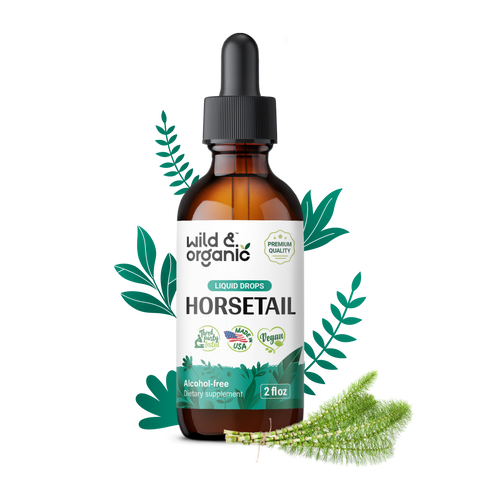Horsetail, also known by its botanical name Equisetum Arvense, is a remarkable natural herb. With its ancient origin dating back to prehistoric times, it continues to captivate the attention of herbal enthusiasts and wellness seekers alike. Its reedy stems, resembling the tail of a horse, give it the distinctive name "horsetail".
As we delve into the realm of the horsetail plant, this article aims to shed light on two common forms of this herb: dried horsetail and horsetail tincture. With the goal of providing clarity and guidance, we will compare these two herbal preparations, allowing you to make an informed decision about which form best aligns with your unique health needs and goals. Understanding the differences between these products is a crucial step in harnessing the power of this ancient botanical ally!
A Comprehensive Look at Horsetail Extract Benefits
Horsetail has a rich history in traditional medicine, dating back to ancient civilizations. The Greeks, Romans and Chinese used horsetail for a variety of health benefits, including for strong hair, kidney and bladder support, among other uses. In contemporary herbal medicine, this herb continues to be highly regarded for its therapeutic potential. It is especially lauded for its profound impact on hair health.
Today, many people use horsetail extract for hair care. Silica, found in this plant, promotes collagen production, aiding in hair elasticity and strength, while also reducing hair thinning, breakage and brittleness [1].
Complementing this, horsetail contains flavonoids which possess antioxidant and anti-inflammatory capabilities. This dual action helps combat oxidative stress and reduce inflammation [2].
Beside silica, it contains manganese and magnesium. These compounds boast diuretic properties, which support kidney function.
The benefits of horsetail herb extract also extend to cardiovascular health. It contains potassium, an essential mineral that plays a crucial role in regulating blood pressure [3]. Antioxidants like flavonoids, also present in this remarkable herb, combat oxidative stress and inflammation, protecting heart tissue from damage [2].
Dried Horsetail: Benefits and Applications
Dried horsetail is prepared in a variety of ways to harness its potential benefits. To start with, the plant is harvested, typically during the summer when its medicinal components are at their peak. After harvesting, it is carefully dried, a process that preserves its active compounds. Once dried, horsetail can be used in several forms, such as loose herbs for tea or ground into a powder for supplements and topical applications.
When used in tea, dried horsetail herb is usually steeped in boiling water, allowing the nutrients to infuse. This tea is not only consumed for internal health benefits but can also be applied topically. In topical applications, horsetail tea is used as a skin rinse or added to baths, believed to support healthy skin and serve as a supplement for minor wounds or rashes due to its purported antimicrobial properties [4], [5].
Dried horsetail offers a distinct advantage due to its longevity. When the plant is dried, its beneficial compounds are preserved in a more stable state, making it a convenient option for long-term storage and use. This drying process not only extends the shelf life of the herb but also intensifies its active ingredients, which can be more potent than in its fresh form.
However, despite its benefits, caution is advised when using dried horsetail. Dried horsetail plant is highly concentrated, which highlights the importance of moderate intake.
Horsetail as a Tincture: The Benefits of the Liquid
A tincture is a concentrated herbal extract where the active constituents of a plant are extracted into a solvent, such as alcohol, vinegar or glycerin. This process typically involves steeping the herb in a liquid to draw out its beneficial compounds.
Organic horsetail liquid extract offers several advantages, including ease of dosage. Unlike teas or capsules, tinctures can be easily adjusted to meet individual needs. A few drops can be added to water or any beverage, allowing for a convenient and controlled intake of the herb. This ease of use, combined with the high absorption rate, makes Horsetail root tincture a practical and efficient way to incorporate the benefits of this ancient herb into a modern wellness routine.
Traditionally, alcohol is primarily used as the solvent due to its efficiency in extracting a wide range of plant chemicals and preserving them for a long period. However, in a shift towards more natural and clean products, we at Wild & Organic use vegetable glycerin instead of alcohol for our Horsetail herb tincture. This approach aligns with the commitment to offering pure and clean products, catering to those who avoid alcohol for personal or health reasons.
As a solvent, glycerin presents several advantages. It is a mild and sweet-tasting liquid, making the tincture more palatable, especially for those who might find the taste of alcohol-based tinctures too strong or unpleasant. Moreover, glycerin is gentle on the stomach, which can be a significant consideration for individuals with sensitive digestive systems!
Plus, our Horsetail drops boast a 98% absorption rate. This means you get almost all of the beneficial compounds of the horsetail herb.
A Comparative Look at Tinctures and Dried Forms
Comparing liquid horsetail extract and dried horsetail weed reveals key differences in potency, concentration of active compounds and absorption rates, which are essential factors in their effectiveness and suitability for different health needs.
Starting with potency and concentration, horsetail tincture generally offers a more potent form of the herb. This means that even small quantities of the tincture can deliver a significant dose of the herb's beneficial compounds, allowing for more profound and long-lasting benefits. In contrast, dried horsetail contains these compounds in a less concentrated form. This can be particularly beneficial for those who may be sensitive to stronger preparations.
The absorption rate is another critical point of comparison. Tinctures typically ensure that a substantial amount of the herb's beneficial properties are directly absorbed into the bloodstream. This high absorption rate means that the body can utilize almost all of the active compounds present in the tincture, making it particularly effective for those seeking more pronounced therapeutic benefits.
On the other hand, the body may not absorb the active compounds in dried horsetail as efficiently, especially when consumed as tea. The digestive process can reduce the amount of active ingredients that enter the bloodstream, leading to milder effects compared to a tincture. This form will suit those who have sensitive stomachs or for those who look for milder benefits.

Wild and Organic Horsetail Tincture - 4 fl.oz. Bottle
Dried Horsetail or Horsetail Tincture: Which One to Choose?
When navigating the choice between dried horsetail and horsetail tincture, it is important to consider their distinctive benefits and how these align with your specific health needs and goals.
Dried horsetail is often a great choice for those seeking a gentle approach to wellness, particularly beneficial for those interested in maintaining general health. The ritual of preparing and consuming horsetail tea can also be a soothing, mindful practice, making it a good fit for those who appreciate the process as much as the benefits. Additionally, for those with sensitive digestive systems, dried horsetail provides a gentle alternative.
On the other hand, horsetail tincture is more concentrated and offers a higher absorption rate, making it a better option for those seeking more pronounced therapeutic effects. It is particularly useful for addressing specific conditions where a potent dose of the herb's active compounds is desired. The tincture's ease of use and dosage control also makes it a convenient choice for busy lifestyles or for those who struggle with the taste or preparation of herbal teas.
Ultimately, the choice between dried horsetail and horsetail tincture should be based on your individual health needs, preferences and goals. Additionally, consulting with a healthcare professional can provide additional guidance, especially if you have specific health conditions or concerns. This personalized approach ensures that you can make the most of what horsetail, in its various forms, has to offer!
Final Thoughts
Horsetail is indeed a fascinating herb, offering a variety of health advantages. From nurturing hair care to supporting heart health, horsetail benefits are as diverse as they are significant.
Available in various forms, each suited to different health needs and preferences, it's the dried horsetail and the tincture that particularly stand out for their unique effects on the body! Ultimately, whether you choose dried horsetail for its soothing, ritualistic qualities or the tincture for its convenience and potency, both forms ensure that the remarkable benefits of this ancient herb are accessible to all.
Why Choose Horsetail Supplements?
Wild & Organic offers horsetail in a tincture form, providing a potent and effective way to enjoy the myriad benefits of this herb, be it enriching your hair care routine or promoting cardiovascular wellness. By choosing this tincture, you're opting for a product that promises to deliver the profound benefits of horsetail in a convenient and effective form!
Resources:
- https://www.healthline.com/health/horsetail-for-hair
- https://www.healthline.com/nutrition/horsetail#what-it-is
- https://pubmed.ncbi.nlm.nih.gov/16467502/
- https://www.ncbi.nlm.nih.gov/pmc/articles/PMC10141616/
- https://www.ncbi.nlm.nih.gov/pmc/articles/PMC4441770/




